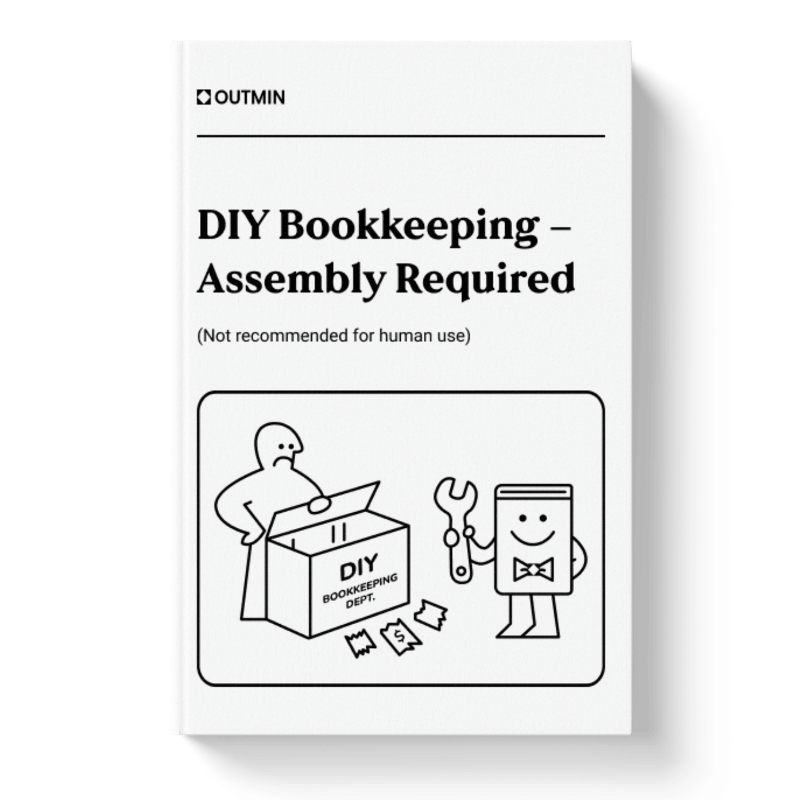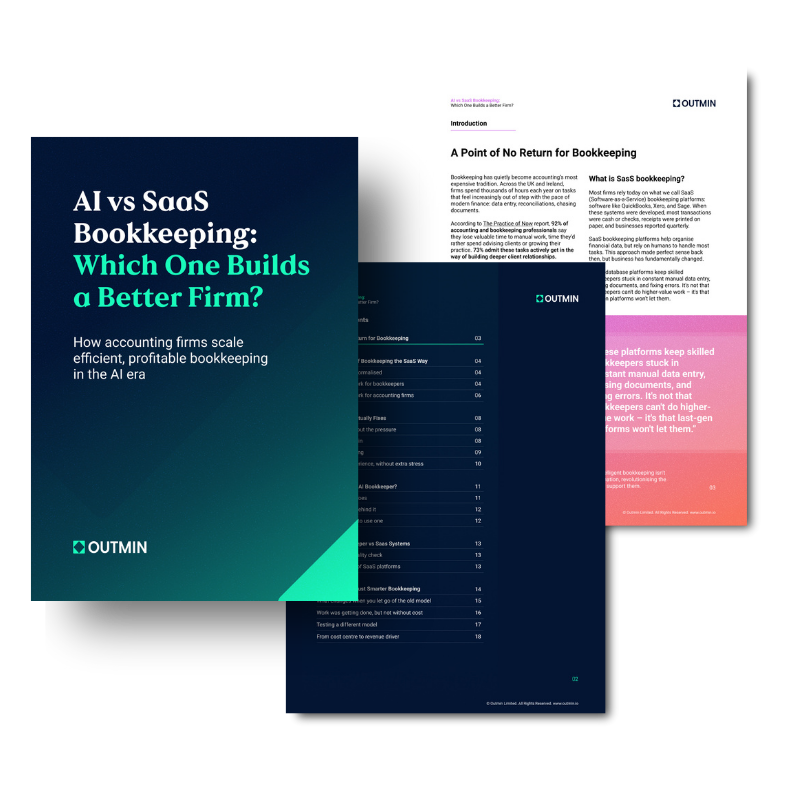July 8, 2024
What is Traditional Accounting? And Why It's Failing You

Here at Outmin, we talk a lot about “traditional accounting” and how we’re fixing a broken, archaic accounting system. But you may be wondering, “What exactly is traditional accounting?”
If you google the term, you’ll find a lot of information about “accrual basis” accounting versus cash basis accounting.

Now, this is not what we mean when we talk about “traditional accounting”. We're actually focusing on the bigger picture.
Traditional Accounting Isn't Made For Modern Hospitality
When we refer to traditional accounting, we're talking about an outdated industry stuck in the past. An outdated, fragmented approach to accounting that most businesses are forced to accept as standard today. This involves a mix of manual processes, disparate software tools, and multiple professionals handling different financial tasks.
Traditional accounting is an industry stuck in the past. An outdated, fragmented approach to accounting that most businesses are forced to accept as standard today.
The system you know as “traditional accounting” is riddled with inefficiencies, high costs, and time-consuming tasks that often fall back on the business owner. Many hospitality owners simply accept this as normal and don’t expect anything better – but that’s a mistake. Let’s have a closer look.
The Conventional Accounting Setup Is Overly-Fragmented
If you run a hospitality business, you know how complex (and, often times, chaotic) it can get when it comes to managing an entire financial function. We’re talking: bookkeeping, payroll management, tax compliance, inventory, expense tracking, invoice processing… There’s just so much involved in managing the finances of a business, it can make your head spin.
To tackle all of this, businesses typically rely on a combination of manual processes, various software tools, and an army of professionals to handle all financial tasks. And that’s a problem.
1. Diverse Software Tools
Many hospitality businesses use various financial tools, such as Sage, Quickbooks, or Xero, to handle different financial processes. One problem with these software tools is that they are often designed for accountants and not for non-finance business owners, which can lead to frustrating delays and errors.
The other issue is that these software programs often have limited integration capabilities. For example, a US survey by SMB Group revealed that the majority of the Small and Medium Businesses surveyed (61%) use manual data entry via Excel or other batch file uploads just to integrate different financial management software solutions.
61% of Small and Medium Businesses use manual data entry via Excel or other batch file uploads just to integrate different financial management software solutions.”
- SMB Group
While each of these tools serves a distinct purpose, collectively, they create a chaotic mess. Switching from one application to another not only wastes your precious time but opens the door for costly mistakes and inconsistencies.
2. Multiple Professionals and Outdated Communication
Besides managing myriads of software tools, conventional accounting practices also involve multiple professionals, either outsourced or in-house. Bookkeepers, accountants, tax advisors, compliance officers, payroll specialists, auditors – each with their own set of demands, schedules, and billing rates.
The end result is a tangled web of emails, chats, and invoices that makes it even harder to keep track of your business's financial health.
You’re also probably used to slow response times and communication via email, letters, and phone calls. You may see this as the norm, but you shouldn’t – there are better ways.
3. Time-Consuming Manual Tasks
Accounting is a time-intensive task. Manual data entry, reconciliation, report generation, and countless other routine tasks can eat up a significant portion of your workday. In fact, a report by Plum Consulting shows that SMBs across eleven countries waste around 120 working days per year just on admin tasks!
Not only that but manual tasks are much more likely to result in errors and miscalculations. A Gartner study showed that “eighteen percent of accountants make financial errors at least daily, with a third making at least a few financial errors every week, and over half (59%) making several errors per month.”
eighteen percent of accountants make financial errors at least daily, with a third making at least a few financial errors every week, and over half (59%) making several errors per month.
- Gartner
The time-consuming nature of manual tasks and the potential for errors is very characteristic of traditional accounting.
Fortunately, that is changing.
4. Data Silos
Last but certainly not least, the traditional accounting setup often leads to the creation of data silos. According to Globema, “A data silo is a collection of data controlled by a specific group within an organisation, hindering seamless accessibility for other departments or teams.”
With data scattered across various tools and systems, getting a comprehensive view of your financial situation can be a daunting task. This lack of transparency can hamper decision-making and limit your ability to react swiftly when an opportunity, or crisis, arrives.
Flaws in the System – Why Accounting Fails Modern Hospitality
A dynamic hospitality industry requires agility, quick decision-making, and accurate forecasting. Unfortunately, traditional accounting methods often fall short. They're simply not equipped to keep up with the rapidly evolving needs of today's hospitality businesses.
Traditional accounting…
- Is inefficient and time-consuming
- Leads to errors and inaccuracies
- Doesn’t provide timely, transparent data
- Is expensive
- Lacks integration
- Gets too complex and too costly as the business scales
The fragmentation of conventional accounting inevitably leads to inefficiencies, slow feedback, and higher costs. Worst of all, much of the work still falls on the business owner.
In contrast, automated accounting systems like Outmin offer an advanced, efficient, and cost-effective solution for modern hospitality businesses.
Why is Automated Accounting the Right Move?
Departing from conventional methods, automated accounting uses technologies like AI and machine learning to reduce friction, streamline operations, and remove most of the work put on the business owner's shoulders.
From automated invoice processing and timely financial updates to swift tax calculations and insightful financial forecasting – the scope of automated accounting is vast and transformative.
The main benefits include:
- Increased efficiency
- Time and money saved
- Improved decision-making based on timely insights
- Improved data accuracy
- Easy scalability
A real-life example that showcases the transformative power of automated accounting is PI Pizza. They were juggling multiple software, tools, and professionals, just to feel overwhelmed by the amount of work that was still left to do. After changing to Outmin, they reduced accounting costs by 66% and saved 120 hours a year. Not too shabby, right?
Here's The Bottom Line
Traditional accounting has outdated, inefficient processes that sabotage a rapidly-innovating hospitality industry. Its fragmented approach overwhelms business owners and overcomplicates a process that should be fully integrated and holistic.
Many hospitality businesses are transitioning towards automated accounting to save time, money, and headaches.
At Outmin, we offer a unified solution specifically designed for the hospitality sector. We remove all the tedious tasks from your plate while offering real-time cash flow reports and financial oversight that's as dynamic as your day-to-day operations.
If you’d like to learn more about a financial solution that grows with you, understands your needs, and ultimately doesn't fail you, just talk to us! We’re happy to help.









